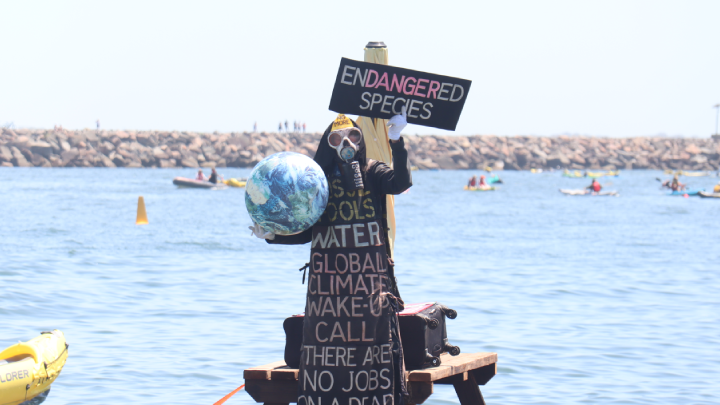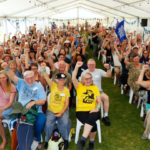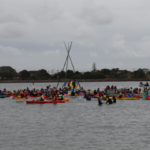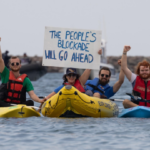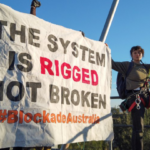People’s Protest Scores a Resounding Victory Over State Repression as Coal Ship Blocked
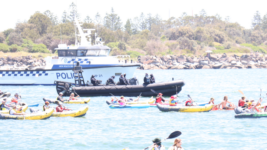
A wave of euphoria swept across the thousands of civilians crowding Newcastle’s Horseshoe Beach at around 11.30 am on Sunday, as word spread that the 200-odd kayakers who’d managed to block the shipping lane into Newcastle Coal Port against the odds, had then succeeded in making the Golden Soul, a massive bulk carrier filled with coal, turn around and delay its scheduled arrival.
One hundred and seventy regular people were taken into police custody whilst waterborne on Newcastle Harbour last weekend. A few were arrested on Saturday, but the vast majority were picked off during the mass blocking of the shipping lane that began at around 10 am on Sunday, and was held despite the Minns government having imposed an exclusion zone over the waterway days prior.
NSW Police News confirmed after 6 pm on Sunday that 156 adults and 14 youths had been charged, and of these, 138 had been slapped with the 2022 antiprotest regime offence of disruption of a major facility, contrary to section 214A of the Crimes Act 1900 (NSW), which means these normal people are facing draconian penalties of up to 2 years prison time and/or a $22,000 fine.
Indeed, Newcastle climate defence group Rising Tide and its supporters triumphed over a deluge of state repressions, which not only saw the illegally-applied exclusion order lifted by the courts last Friday evening, but they proved to the NSW government and state law enforcement that their right to protest is upheld regardless of the ongoing attempts of NSW authorities to supress it.
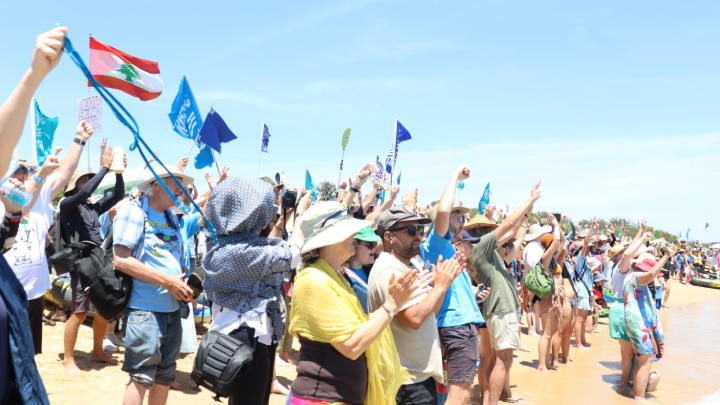
Good and hearty economic disruption
“This is the icing on the cake. It’s been a wonderful weekend, but until today, we haven’t caused any economic disruption. And now we have,” said climate defender Brad Homewood, after over 200 kayaks had taken to the shipping lane on Sunday.
“Arrests started happening over an hour ago. Arrests on the water are slow. So, police on their zodiac boats or jet skis are picking them off one at a time.
“We are going to see hours of economic disruption here, which under the circumstances of not having the Form 1 and having had an exclusion zone put in place and then the zone was defeated in the Supreme Court, under those repressive circumstances, this is a win for people power,” added the activist, who’s undergone his fair share of arrests for climate.
As is required for a protest that seeks approval to obstruct public thoroughfares without participants fearing the arrest of police, Rising Tide organisers lodged its Form 1 notification of a public assembly with NSW top cop Karen Webb weeks before the required 7 days warning period. However, the police commissioner took the matter to the NSW Supreme Court to have the blockade shut down.
Webb argued safety concerns in court. Supreme Court Justice Desmond Fagan ordered the blockade should not go ahead. This then meant the event’s Form 1 had been disapproved, and therefore, if any people continue to obstruct Newcastle Harbour shipping lane last week, they could be arrested. But the judge further noted that his ruling didn’t make all associated behaviour illegal.
And as to why Homewood considers Rising Tide did triumph in the face of unprecedented levels of repression thrown at it, Homewood told Sydney Criminal Lawyers. “This is people leaning into the repression, which is what you have to do with repression, and saying, ‘We are not going to put up with that.’”
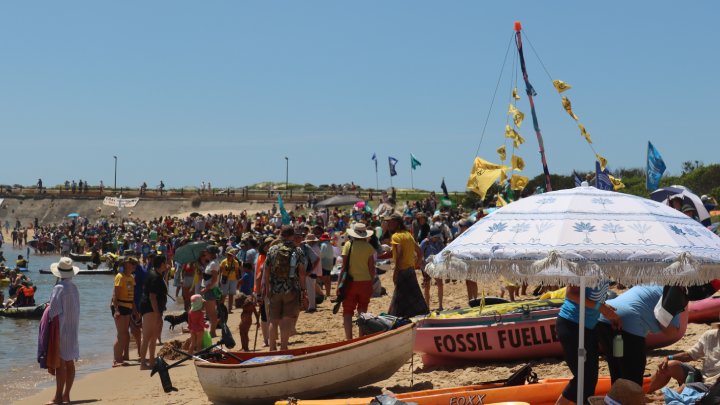
“Couldn’t put Humpty together again”
“My name is sergeant _______ from the NSW police negotiation unit,” said a man in blue over a loudspeaker, attempting to send a message to the kayakers in the harbour. “If you remain in the shipping channel, you may be committing an offence under section 214A of the Crimes Act 1900.”
Section 214A of the Crimes Act contains the offence of disrupting a major facility, which includes any NSW port. This is one half of the laws that make up the NSW antiprotest regime, and it carries the draconian penalties that are signature of it, which comprise of 2 years inside and/or a $22,000 fine.
This regime was a first of its kind in Australia, although similar severe penalties have been enacted into law in Tasmania, Victoria and South Australia since. And these laws are part of a broader crackdown globally, which began with climate defenders and now too targets supporters of Palestine.
The other offence pertaining to the crackdown on NSW protest is contained in section 144G of the Roads Act 1993 (NSW). It comprises of disruption of major bridges, tunnels or roads in the greater Sydney, Newcastle and Wollongong regions, with the same steep penalties applying as to facilities.
Prior to last weekend, the 2022 imposed NSW antiprotest regime had appeared to have drawn a line in the sand in terms of preventing unauthorised protests, despite some noted exceptions.
But last weekend’s huge act of civil disobedience in the face of such an aggressive antiprotest regime to the point that more than 170 people flaunted their disregard towards any resulting penalties has undoubtedly rendered these laws much less ferocious than the threat they involved a week ago.
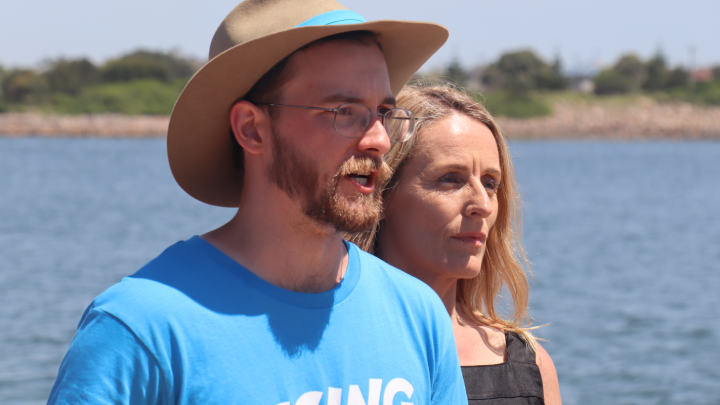
A new pattern in play
Organised by Rising Tide for the second year running, The People’s Protest of the World’s Largest Coal Port successfully blocked the Newcastle Harbour against the odds, in order to raise awareness around the climate crisis that is well underway, despite the fact that the Minns government, the Albanese government and indeed, all Australian governments are doing nothing about it.
The coal exports that run through the Port of Newcastle contribute to 1 percent of global emissions.
Rising Tide wants an end to all new coal and gas approvals in Australia, along with imposing a 75 percent tax on all fossil fuel exports, with that revenue used to fund community and industrial transition to renewables, as well as ending all coal exports from Newcastle by 2030.
NSW police commissioner Webb took Rising Tide to court in early October and to have its Form 1 denied, yet the group continued to assert its right to protest, which led the Minns government to impose the exclusion zone over the entire waterway, but as Rising Tide organiser Zack Schofield told SCL last Thursday, they’d used a law meant to facilitate public events to block the People’s Protest.
NSW Greens MLC Sue Higginson announced on Friday morning that Rising Tide organiser Alex Stuart was taking the Minns government to court, claiming that the 97 hour exclusion zone that had been applied over the entire waterway surrounding Newcastle Harbour was beyond the power provided by the Marine Safety Act 1998 (NSW).
And on Friday afternoon, not long after kayakers had taken to the water and the exclusion zone was about to take hold, word arrived that the NSW Supreme Court had extinguished the order.
“I’ve heard people say the only reason they are here is because of the state government repression,” Homewood continued in respect of why the people triumphed over the onslaught of official measures taken to supress the event.
“I’ve heard people say, they weren’t going to come this year but when the state government denied the Form 1 and then put the exclusion zone in place, they thought, they had to be here.”
